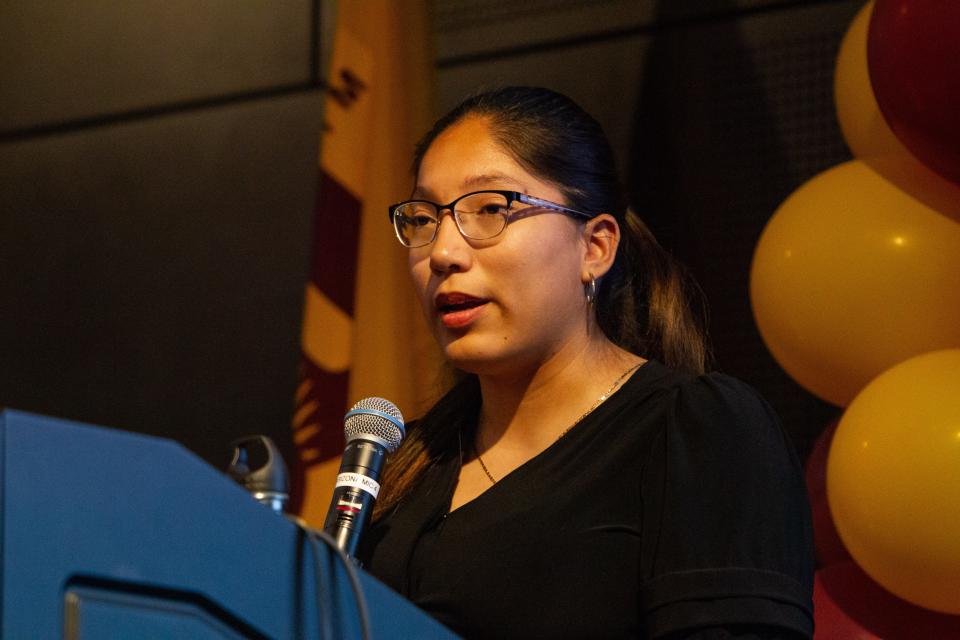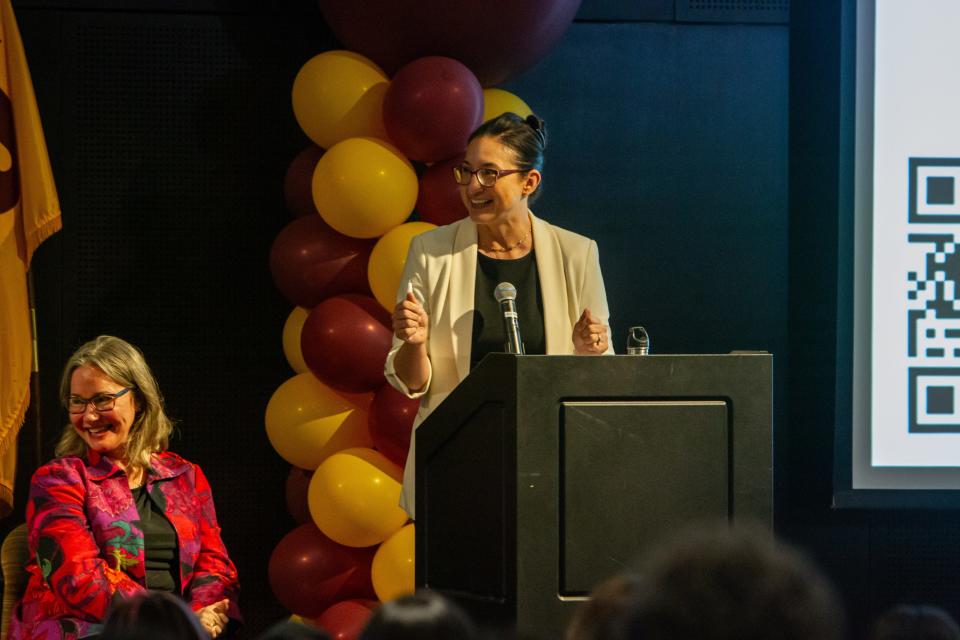ASU program celebrates 40 years of paving the way for first-generation college students
When Stephany Janette Hernandez was in eighth grade, she and her family embarked on a journey that would change the course of her educational future.
Five years later, on Monday, Stephany and her twin brother, Michael Damian, were celebrated among hundreds of other students and their families who, thanks to an Arizona State University program, were supported from an early age so that they may receive a college education.
The Hispanic Mothers and Daughters Program is an initiative by ASU Access that provides college readiness resources and support to Arizona families that help students in grades 8-12 prepare and be admitted into college through family engagement.
On the 40th anniversary of the program, 252 high school students walked through a room to receive their certificates accompanied by their parents, who were equally recognized for their time and commitment.
The purpose of this program is to serve the family, regardless of culture or sociocultural level, according to the deputy director of the program, Ingrid Estrada. “What the leadership of this program seeks is to be able to increase the number of Hispanic students. Our goal is to increase the number of seniors who come to ASU and not just ASU, any university,” Estrada told The Arizona Republic. “The long-term vision is to continue helping and welcoming more families.”
The Hernandez family was among those recognized.
40 years of paving the way for Latinas, students of color
Established in 1984, the program has supported nearly 2,500 families.
Starting in seventh grade, ASU recruiters begin connecting with families across various school districts to identify those interested in receiving resources and training.
The program features online and in-person courses, with visits to the ASU Tempe campus every six months over five years, and all courses are offered in English and Spanish. Additionally, high schoolers attend workshops focused on college admissions and financial aid to prepare them during the application process.

Stephany started with the Hispanic Mothers and Daughters Program in middle school. She and her mother, Armida Hernandez, have attended each and every session since 2019.
“At first it was quite intimidating because university felt so far away. We joined the program right before the pandemic shut everything down, but it was still like four or five years away, and I was like, 'Why do I need to prepare now?'” Stephanie told La Voz Arizona. Having finished the program, she now understands just how impactful the sessions are.
Stephany and Michael will graduate high school in May to continue their higher education at the end of the summer.
Upon graduating from Franklin Police and Fire Department High School in Phoenix, where she had a perfect attendance record all four years, Stephany will participate in an internship with the Arizona Department of Public Safety as part of the criminal records team during the summer. Upon completion, she is enrolled to begin her bachelor's degree at ASU's West Valley Campus, majoring in criminology and criminal justice.
“HMDP showed us the importance of several things that concern admissions”, Stephany said during her speech at Monday's ceremony, representing the program's graduates. “Without these things, we probably wouldn't be here today or be able to graduate.”
Before the program, Stephany's parents were unfamiliar with the U.S. educational system. Having been born and raised in Colima, Mexico, her mother did not understand what accessing higher education entailed. Her participation in the program represented a “before and after” for her and her entire family.
“The program has helped us a lot to get us on track to go straight to university,” Hernandez said. “It has been a great experience for us because now we know the requirements, we know a little more about the system, and in fact, we have been able to help other students."
Hernandez works directly with her community through her Estrella Super Moms Facebook account and for 12 years she has provided information and resources to families who, having immigrated to the U.S. from other countries, want to know how to navigate the education system.
A new focus for the Hispanic Mothers and Daughters Program
Although the Hispanic Mothers and Daughters Program was originally designed to serve Latina mothers and their daughters exclusively, as well as support first-generation students, today any interested student and family is considered, regardless of race, ethnicity or gender, according to Estrada.
More than 50% of freshmen enrolled at ASU in 2017 came from underrepresented communities. The pandemic changed the focus of the Hispanic Mothers and Daughters Program and, since then, barriers have been reduced and access has been expanded for all types of families to enter the program, according to Estrada, who also highlighted the importance of parent participation, who are often the ones encouraging their children.
Of the more than 200 high school students who received their certificates on Monday, 121 will begin their college careers at ASU this fall. Also recognized during the ceremony were 18 ASU bachelor's graduates who were program participants in the previous decade.

Chandler Municipal Court Presiding Magistrate Alicia Skupin, who participated in the Hispanic Mothers and Daughters Program more than 35 years ago, offered words of motivation to students and families on Monday who, like her, have experienced challenges and obstacles on her path toward higher education.
“My family didn't know engineers, doctors, accountants, lawyers, scientists or computer programmers. My parents knew college was important, but they didn't know the path or how to get me there except to do well in school. That's where HMPD came in, during my eighth grade. Turn an obstacle into an opportunity,” Skupin, whose mother is originally from Sonora, Mexico, told the audience. “For parents in the room, there are so many examples of how we can change what we see as an obstacle into an opportunity. So many lessons for our children to learn.”
Reach La Voz reporter Silvia Solis at silvia.solisgarza@gannett.com.
This article originally appeared on Arizona Republic: ASU's Hispanic Mothers and Daughters Program

